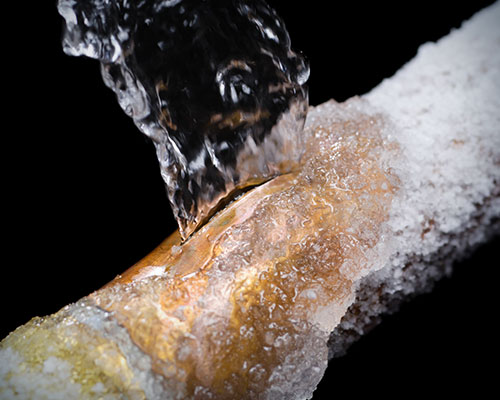Why Water Pipes Freeze and Burst (and What You Can Do About It)
It never fails. When the temperature drops, the experts at Flood Damage Pro know that we just have to wait for the temperature to creep back up again and our phone will start ringing. We get called out to properties that are left drenched due to a frozen burst water pipe releasing a flood as it thaws. While this may seem completely preventable, it depends partly on factors beyond anyone's control, like what happens when water freezes and how cold the weather gets.
Water Expands When It Freezes
Why does ice take up more space than water does?
In a liquid form, molecules of water are constantly in motion. Because one side of the molecule (the Hydrogen) has a positive charge, and the two Oxygens on the other side have a negative charge, water molecules are constantly forming bonds, kind of like the magnets in children's building toys. They connect, but they also break apart with ease.
With changes in temperature, the movement of the water molecules also changes. As the temperature of the water lowers, the molecules slow down. This allows the molecules to attract each other and to lock into a more defined structure - typically rings of 6 molecules together. This is why nearly all snowflakes have six sides - it is how water molecules form bonds as the temperature drops.
This crystalline arrangement is what gives ice its structure and makes it take up more room. It is less dense than liquid water, as molecules can't get as close to each other as they could when they could move around more freely.
What this means for your plumbing
So, what happens when ice expands inside a pipe?
We can picture this if we think about what happens when you put water in an ice cube tray - if you put water up to the top of the tray, the ice cubes won't be flat but will extend higher than its compartment.
When the water is in the process of freezing in the pipe, at first, the ice will be able to increase in volume by going upwards or downwards in the pipe. As more water freezes, the ice stops having room to expand, and it applies pressure outwards against the wall of the pipe. If this pressure is strong enough, it will cause the pipe to bulge and even crack.
Different pipe materials will respond to this pressure in different ways. Full disclosure - just because a pipe freezes, it doesn't mean that the pipe will burst. Pipes made of copper are more likely to burst, while PVC pipes and pipes from other plastic materials are less likely to suffer pipe bursts when frozen.
When to worry about freezing pipes
Water freezes at 32°F, so you might think that any time the temperature goes below that, you need to worry about pipe bursts. However, the risk can change depending on:
- The location of the pipe: Any pipes or lines that are outside the structure (like the tap for the water hose in the backyard) or in unheated areas like attics or crawl spaces are more vulnerable to freezing at or just below freezing. However, pipes in exterior walls are also warmed by the inside of the structure, so they become vulnerable to pipe bursts when the temperature drops below 20°F.
- How well-insulated is the pipe from the cold? Just like we bundle up in frigid temperatures, wrapping up pipes snugly can help protect them from freezing.
Warning Signs When The Pipe is Freezing
If water freezes inside a pipe and the pipe cracks, you might not even know there is a problem until the ice begins to melt, and then the pipe burst is suddenly apparent. For this reason, it can be helpful to look out for the following signs:
- Reduced water flow and pressure from the faucet, particularly if the pipes run through the exterior walls of the building.
- Visual swelling or bulging of the pipe.
- Strange noises from the pipes or drains. As the water starts to freeze, ice trying to go through the pipes can knock against the sides and make a lot of noise.
Burst Water Pipe Prevention
Prevention starts before the weather even gets cold. This can take the form of making sure your pipes are properly insulated and following a checklist to winterize your property, like detaching garden hoses.
It continues when the meteorologists predict freezing temperatures. That gives you an opportunity to open lower cabinet doors to expose the pipes to heated indoor air and open the faucets in a sensitive area. If it drips on a continuous basis, then the water in the pipe remains in motion to reduce the chances of it freezing.
What to Do About A Burst Water Pipe
If you discover that your pipe has burst, this is a water damage emergency. Be very careful and check first about the electricity in the area. As long as it is safe to do so, stop the flow of the water into your home by turning off the water main or even a localized water shutoff.
To fix the broken pipe, call your trusted local plumber. Then, call Flood Damage Pro to clean up and restore your property. From emergency water extraction to structural drying and mold prevention, our restoration experts have the certified training and experience to take your property from "Oh, my, that's a lot of water" to completely dry.

Call now for an on-site evaluation and inspection for emergency services


On every job
CALL FLOOD DAMAGE PRO
